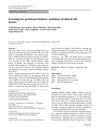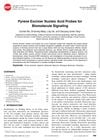 50 citations,
June 1999 in “Annals of Oncology”
50 citations,
June 1999 in “Annals of Oncology” Giving docetaxel weekly at 40 mg/m² is manageable and has low toxicity for cancer patients.
 49 citations,
March 2019 in “Journal of Investigative Dermatology”
49 citations,
March 2019 in “Journal of Investigative Dermatology” Skin fat plays a key role in immune defense and healing beyond just storing energy.
 49 citations,
March 2009 in “Archives of Gynecology and Obstetrics”
49 citations,
March 2009 in “Archives of Gynecology and Obstetrics” Older age, higher BMI, and family history of diabetes increase the risk of gestational diabetes in pregnant women.
 49 citations,
July 2004 in “Anesthesiology”
49 citations,
July 2004 in “Anesthesiology” The document concludes that more research is needed to understand how to treat muscle pain with drugs.
 47 citations,
June 2011 in “Movement Disorders”
47 citations,
June 2011 in “Movement Disorders” The LRRK2-G2019S mutation in Parkinson's disease has a lifetime penetrance of 25-35%, and finasteride may help reduce symptoms in adult male Tourette syndrome patients.
 46 citations,
September 2013 in “PLOS ONE”
46 citations,
September 2013 in “PLOS ONE” Thyrotropin-Releasing Hormone helps heal wounds in frog and human skin.
 46 citations,
September 2011 in “Movement Disorders”
46 citations,
September 2011 in “Movement Disorders” Finasteride reduces Tourette syndrome symptoms, but results may be limited due to potential biases.
 45 citations,
February 2019 in “Journal of Affective Disorders”
45 citations,
February 2019 in “Journal of Affective Disorders” Melatonin improved mental health and metabolism in women with PCOS.
 43 citations,
February 2019 in “International immunology”
43 citations,
February 2019 in “International immunology” Special immune cells called Regulatory T cells help control skin inflammation and repair in various skin diseases.
 43 citations,
January 2016 in “International Journal of Andrology”
43 citations,
January 2016 in “International Journal of Andrology” Finasteride caused long-term sexual and non-sexual side effects in young men with hair loss.
 43 citations,
February 2013 in “Developmental dynamics”
43 citations,
February 2013 in “Developmental dynamics” Foxi3 expression in developing teeth and hair is controlled by the ectodysplasin pathway.
 42 citations,
January 2014 in “Cold Spring Harbor Perspectives in Medicine”
42 citations,
January 2014 in “Cold Spring Harbor Perspectives in Medicine” Hair growth is influenced by various body and external factors, and neighboring hairs communicate to synchronize regeneration.
 42 citations,
January 1998 in “BioDrugs”
42 citations,
January 1998 in “BioDrugs” Azathioprine's effectiveness and safety require careful monitoring and more research, especially regarding its use with corticosteroids and the role of TPMT status in patients.
 41 citations,
December 2018 in “Experimental Dermatology”
41 citations,
December 2018 in “Experimental Dermatology” Understanding how melanocyte stem cells work could lead to new treatments for hair graying and skin pigmentation disorders.
 41 citations,
December 2008 in “Journal of the American Academy of Dermatology”
41 citations,
December 2008 in “Journal of the American Academy of Dermatology” Oral valganciclovir improved a patient's skin condition caused by immunosuppression.
 40 citations,
December 2019 in “Neurobiology of Stress”
40 citations,
December 2019 in “Neurobiology of Stress” Neuroactive steroids show promise for treating mental and neurological disorders by targeting GABA_A receptors.
 40 citations,
December 2012 in “Epilepsia”
40 citations,
December 2012 in “Epilepsia” Neurosteroids change how GABA_A receptors work in the brain, which could be important for treating temporal lobe epilepsy.
 40 citations,
January 2010 in “Annales D Endocrinologie”
40 citations,
January 2010 in “Annales D Endocrinologie” The French Endocrine Society suggests diagnosing PCOS with two of three signs, recommends lifestyle changes and clomiphene for treatment, and calls for more research on certain treatments and tests.
 40 citations,
October 2009 in “Journal of Biomedical Nanotechnology”
40 citations,
October 2009 in “Journal of Biomedical Nanotechnology” Pyrene excimer nucleic acid probes are promising for detecting biomolecules accurately with potential for biological research and drug screening.
 39 citations,
May 2011 in “Movement Disorders”
39 citations,
May 2011 in “Movement Disorders” Finasteride may help reduce symptoms in male Tourette syndrome patients.
 38 citations,
February 2012 in “Aesthetic Surgery Journal”
38 citations,
February 2012 in “Aesthetic Surgery Journal” Facial rejuvenation surgery has evolved to yield natural results with low complication rates, and more men and older patients are choosing this surgery.
 38 citations,
January 2011 in “Endocrine Journal”
38 citations,
January 2011 in “Endocrine Journal” Weight loss and metformin don't significantly change vaspin levels in women with PCOS.
 38 citations,
October 2006 in “Fertility and Sterility”
38 citations,
October 2006 in “Fertility and Sterility” The document concludes that identifying the cause of amenorrhea is crucial for proper treatment.
 38 citations,
January 1997 in “Gynecological Endocrinology”
38 citations,
January 1997 in “Gynecological Endocrinology” Finasteride and flutamide effectively reduce hirsutism in PCOS women, with flutamide also lowering hormone levels.
 37 citations,
March 2012 in “International Journal of Radiation Biology”
37 citations,
March 2012 in “International Journal of Radiation Biology” Mobile phone radiation can cause DNA damage in human hair root cells.
 37 citations,
June 2011 in “Journal of Cellular Biochemistry”
37 citations,
June 2011 in “Journal of Cellular Biochemistry” Androgen is important in controlling stem cell differentiation, reducing fat development, and increasing lean mass.
 36 citations,
April 2016 in “British journal of dermatology/British journal of dermatology, Supplement”
36 citations,
April 2016 in “British journal of dermatology/British journal of dermatology, Supplement” A substance called VIP might protect hair follicles from being attacked by the immune system, and problems with VIP signaling could lead to hair loss in alopecia areata.
 36 citations,
January 2015 in “Dermatology”
36 citations,
January 2015 in “Dermatology” Bimatoprost was found to be safer and more effective than mometasone furoate for treating scalp hair loss.
 36 citations,
May 2011 in “Dermatologic therapy”
36 citations,
May 2011 in “Dermatologic therapy” No treatments fully cure or prevent alopecia areata; some help but have side effects or need more research.
 36 citations,
April 1990 in “Dermatologic Clinics”
36 citations,
April 1990 in “Dermatologic Clinics” Most pregnant women experience skin changes like darkening and stretch marks, and some may have skin conditions that usually get better after giving birth.





























